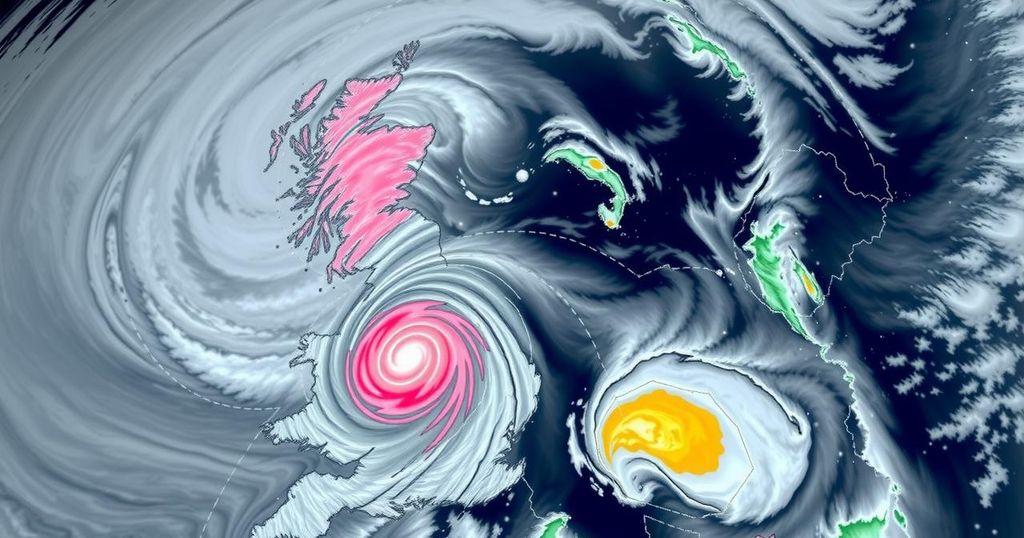Storm Darragh has left hundreds of thousands without power in the U.K. and Ireland, leading to fatalities and widespread disruption. Meanwhile, severe flooding from monsoon rains has resulted in numerous deaths in Thailand and Malaysia, prompting government emergency responses and outlining the urgent need for improved climate preparedness.
In recent days, the U.K. and Ireland faced significant disruptions due to Storm Darragh, which brought wind gusts reaching up to 154 kilometers per hour. This storm has been designated as the fourth named storm of the current European windstorm season. Widespread power outages affected hundreds of thousands of residents, and the aftermath of this weather event has resulted in extensive flood warnings across both regions. Unfortunately, two fatalities were reported due to falling trees, illustrating the storm’s severity.
The Met Office issued an unprecedented red weather warning, typically reserved for life-threatening conditions, while disruptions to flight and train services were widespread. Emma Pinchbeck, Chief Executive of the independent climate advisory body, emphasized the importance of improved planning for extreme weather events, stressing the necessity for better flood defenses and housing assessments in flood-prone areas.
Meanwhile, Thailand and Malaysia encountered their own devastating weather conditions, with heavy monsoon rains resulting in catastrophic flooding. Thailand reported at least 29 deaths, while Malaysia noted six fatalities. Thousands have been displaced and are currently residing in evacuation centers, prompting emergency responses that include the deployment of rescue teams to the most affected regions.
In Thailand, government officials are increasing flood relief funds and providing financial assistance to families impacted by the disaster. Environmental expert Pianporn Deetes pointed out that human activities, such as deforestation, exacerbate flooding issues in the region. In Malaysia, the impact was similarly severe, with continuous rainfall leading to substantial agricultural losses for local farmers and extensive damage estimated at approximately 1 billion ringgit.
The Malaysian government is exploring compensation options for those affected by the flooding while prioritizing repairs to critical infrastructure such as schools and healthcare facilities. These events underscore the urgent need for enhanced disaster preparedness and response strategies amidst increasing climate-related challenges.
The severe weather affecting the U.K., Ireland, Thailand, and Malaysia demonstrates the growing impact of climate change and extreme weather events across the globe. As regions confront unprecedented flooding and storms, the importance of effective disaster management and infrastructure adaptation becomes increasingly apparent. Recent storms in Europe have resulted in loss of life, significant power outages, and major disruptions to transportation, while countries in Southeast Asia struggle under the weight of monsoon rains that are exacerbated by human activity. This widespread adversity highlights the interconnectedness of global weather patterns and the need for a coordinated response to climate resiliency.
In summary, the recent storms and flooding across the U.K., Ireland, Thailand, and Malaysia reveal the harsh realities of climate change and its profound effects on communities. The challenges posed by Storm Darragh and monsoon rains require urgent attention to disaster preparedness and infrastructure improvements, highlighting the need for government intervention and community support in the aftermath of such calamities. As climate events become more frequent, it is critical for nations to enhance their resilience strategies to mitigate the impact on vulnerable populations.
Original Source: news.mongabay.com







